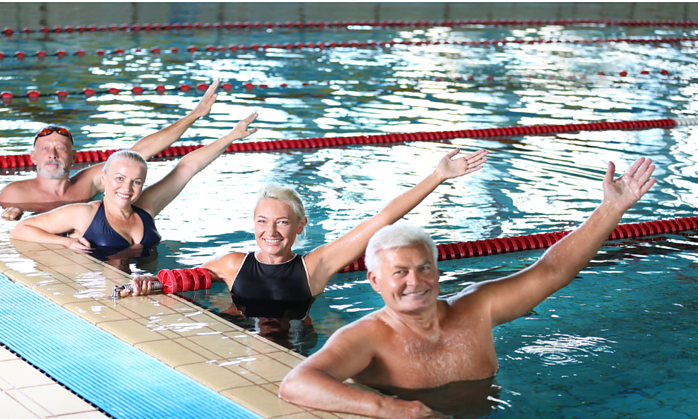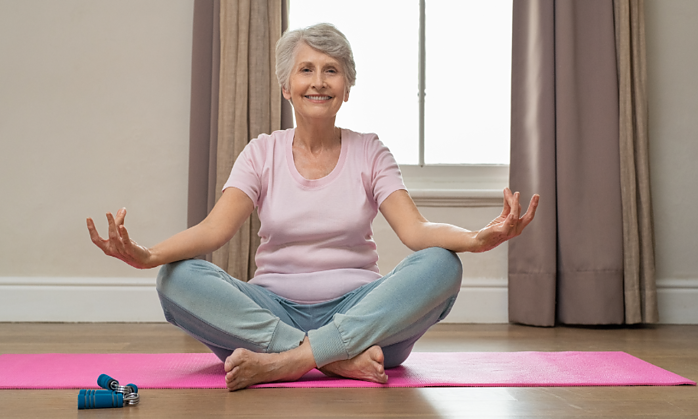Have you ever wondered if your thoughts can affect your physical well-being, or vice versa? Guess what? They can. In over 50s, the interplay between the mind and body isn’t just a casual link; it’s a powerful bond that can greatly impact health and happiness. The mind-body connection refers to how our thoughts, feelings, emotions, and beliefs can influence our biological functioning and vice versa.
I’m here to help you understand how this connection works, especially as it becomes more crucial in later years. As we age, our bodies undergo various changes, and maintaining a harmonious relationship between mind and body can provide a solid foundation for healthier aging.
Choose strategies that resonate with you to boost this connection. This can include anything from mindful meditation to simple daily affirmations. What you’re aiming for is a state of mental and physical synergy where stress is less likely to take a toll, and vitality is at its peak.
If you want to lead a life marked by vitality after 50, it’s essential to recognize that your thoughts can indeed shape your reality. The reverse is also true; caring for your body can lead to a more positive and resilient mindset. As we segue into the world of regular exercise and its impacts, you’re going to find out about how staying physically active is not only good for the muscles and heart but also for the brain and mental health.
The Impact of Regular Exercise on Over 50s
In my opinion, if you’re over 50, embracing an active lifestyle is like hitting a wellness jackpot. Here’s the lowdown: regular exercise is a powerhouse of benefits for both your body and mind. Let’s get into the physical perks first. You’ve got improved strength, better mobility, and a reduced risk of chronic diseases such as heart disease or diabetes. But there’s more. Regular exercise also keeps your weight in check and can improve sleep quality, something that many over 50s strive for.
You’re going to find out about the mental gains next. Stress, anxiety, and depression rates tend to dip among those who stay active. On top of that, exercise can boost brain functions like memory and attention, which may naturally decline with age. These mental health improvements are linked to physical activity promoting the release of feel-good hormones—your body’s natural mood elevators.
I’m here to help you with understanding that exercise isn’t just a preventative tool against physical ailments; it’s a booster for your brain health, too. Sticking to an exercise routine can protect against cognitive decline and even conditions like Alzheimer’s. It keeps the blood flowing, not just to your heart, but all the way up to your brain cells, fueling them with the oxygen and nutrients they need to perform at their best.
Choose something that resonates with you, be it walking, swimming, or a dance class. Weight training is something all over 50s should do it makes us stronger, makes our bones stronger, helps our balance and makes it less likely to be injured from a fall. Make it enjoyable so it becomes a sustainable part of your lifestyle. Remember, your first attempt doesn’t need to be your last. You can always adjust your approach down the road.
A lot is happening quickly once you start exercising—the benefits kick in almost immediately. Success stories from people in this age group who’ve seen transformations can serve as a motivational boost. We’re talking increased vitality, returning to hobbies they thought were in the past, and an overall zest for life. They are the living proof that regular exercise in your 50s isn’t just about adding years to your life, but life to your years.
If You Look After Your Body, You Will Look After Your Mind
I’m going to let you in on a secret that’s not really a secret: taking care of your body is one of the best things you can do for your mind, especially after 50. Your brain thrives when your body is well-nurtured, and the science backs this up. Regular physical health checks, balanced nutrition, and staying hydrated significantly boost cognitive function and mental well-being.
Nutrition plays a starring role here. Choose something that resonates with you when it comes to diet, but remember the goal is to fuel your body with what it truly needs. Foods rich in omega-3 fatty acids, antioxidants, and vitamins can sharpen the mind and combat cognitive decline. You’re going to find out that what you put on your plate matters just as much as the exercises you perform.
Don’t worry too much about launching into a rigorous routine. You can start with simple personal care habits that make a big impact. Prioritize sleep, manage stress through meditation or relaxation techniques, and build a social network to engage your mind.
But it doesn’t stop at diet and sleep. No, it’s also about creating a lifestyle that embraces holistic care—integrating mental exercises like puzzles or new learning endeavors to challenge and stimulate your brain. This isn’t just about preventing decline; it’s also about nurturing growth and resilience.
Combining these approaches sets a strong foundation as we transition into yoga’s timeless wisdom. Understanding the mind-body connection deeply, we’ll explore how this ancient practice paves the way for a serene yet vibrant lifestyle after 50 in the next section.
What Ancient Yogis Knew: Reaching Your Mind Through Your Body
I’m going to touch on a timeless treasure trove of wisdom now. For centuries, ancient yogis have been advocates for the symbiotic relationship between the mind and body. Today, you’re going to find out about the philosophies that have stood the test of time, providing valuable insights for those over 50.
Yoga isn’t just about bending and stretching; it’s a practice that integrates physical postures with breathing exercises and meditation, creating a powerful approach to well-being. Yoga can be particularly beneficial for the over 50s, helping to maintain flexibility, reduce stress, and cultivate mental focus.
Now what exactly did these ancient yogis get right? For starters, they understood that to reach a state of peaceful clarity in the mind, one must engage in the practice of looking after the body. Aspects such as posture, breath control, and meditation are pillars in yoga that enhance this mind-body connection.
Here’s a practical takeaway for you: it doesn’t matter if you’ve never set foot on a yoga mat before. Yoga is accessible to everyone, with modifications and variations to cater to all levels of ability. Start with simple poses and deep breathing exercises; these can have profound effects on your well-being when practiced consistently.
In my opinion, embracing these ancient teachings provides a holistic roadmap to aging healthily and happily. So, I really hope that you give yoga a try as a pathway to bolstering your mind through the care of your body. It’s a peaceful, yet potent form of self-care that’s worth exploring in your journey for a harmonious mind-body connection.
Hey this is a great post you have decided to write on thank you!
I know many individuals whether they over 50 or not, will certainly find this interesting, not to mention helpful especially in such a stressful world where people feel disconnected with their own minds and bodies.
I really enjoyed reading your post and am going to take away a bunch of important information regarding how to look after one self and the importance. Like you have stated looking exercise is a great free way to start somewhere and as people age it certainly will help!
Have a great day!
Yes you are right Sariya we must look after ourselves. Thanks for commenting.